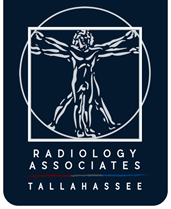Computed Tomography (CT)
At Radiology Associates of Tallahassee, we are pleased to offer the full range of diagnostic CT services. Our state-of-the-art CT scans combine specialized x-rays with innovative computers to provide images of anatomy in exquisite detail. Clearer pictures allow your doctor to make an earlier and more precise diagnosis of your condition and response to treatment.
Learn More About Computed Tomography (CT)
Computed Tomography (CT), also known as computerized tomography or computed axial tomography (CAT), is an advanced X-ray technology that produces a sequence of detailed cross-sectional images of the interior of the head, spine, chest, abdomen or other areas of the body. The complex images are produced by rotating a focused X-ray beam around the patient and taking these X-ray images from numerous angles, guided by a computer. CT examinations produce detailed organ studies by capturing multiple individual image “slices”.
For more information on this and other radiology procedures, please visit www.radiologyinfo.org.
If you are having a CT of the abdomen or pelvis, please arrive 2-3 hour prior to your exam to drink the oral contrast. In addition, do not eat or drink for 6 hours prior to the exam. You may have small amounts of water, if needed, to take medications only.
If you are having any other type of CT exam, please arrive 30 minutes early at our hospital locations, and 10 minutes early at outpatient centers. Please do not eat for two hour prior to your exam.
After your procedure, your physician will receive a copy of your report within 48 hours, and he or she will be the one to give those results to you.
Typically your referring physician will schedule an appointment for you. If you have been asked to schedule the appointment yourself, please have your physician’s order and any pre-authorization information required by your insurance or health plan provider in hand, and call 850-878-4127.
Patients who have diabetes or renal disease require special care because the kidneys are involved in filtering iodine from the bloodstream. These patients should consult with their physician about proper scheduling of the CT scan.
For your CT examination you will be asked to lie on a table that rides on a track through the doughnut-shaped scanner. As the procedure begins, you will hear humming, buzzing or clicking sounds from the CT machine. The table will move in short steps through the scanner as the CT tube rotates around you. At each step, the scanner completes a separate view. The information is processed by the computer and displayed as images on a video screen to the technologist.
You should remain as still as possible to produce the clearest images. Depending upon the procedure being performed, you may be asked to hold your breath for up to 30 seconds. Most exams require 10 to 20 minutes to complete.
If you are given contrast medium intravenously, you may notice a metallic taste in your mouth and a warm sensation throughout your body. These sensations are harmless and subside within a few moments. Oral contrast medium may cause slight changes in bowel movements, which will soon return to normal.
Some patients may have an allergic reaction to the contrast medium, which is iodine-based. Patients who are allergic to iodine may experience itching, sneezing or other allergic symptoms in response. If you are allergic to iodine but must be given contrast medium to produce the proper test results, your physician may choose to pre-medicate you with steroids or other drugs. Anyone experiencing such a reaction will be treated before being released to go home. In rare cases, the contrast medium can trigger anaphylaxis, a life-threatening allergic reaction in which the tissues of the airway become swollen enough to restrict breathing. In such cases, emergency treatment is immediately given. Please let us know if you know or think you are allergic to iodine.
Patients who have diabetes or renal disease require special care because the kidneys are involved in filtering iodine from the bloodstream. These patients should consult with their physician about proper scheduling of the CT scan.
Computed tomography (CT) is a diagnostic imaging test used to create detailed images of internal organs, bones, soft tissue and blood vessels. The cross-sectional images generated during a CT scan can be reformatted in multiple planes, and can even generate three-dimensional images which can be viewed on a computer monitor, printed on film or transferred to electronic media. CT scanning is often the best method for detecting many different cancers since the images allow your doctor to confirm the presence of a tumor and determine its size and location. CT is fast, painless, noninvasive and accurate. In emergency cases, it can reveal internal injuries and bleeding quickly enough to help save lives.
For benefits and risks of a specific CT procedure, and more, please visit (RadiologyInfo.org) https://www.radiologyinfo.org/en/submenu.cfm?pg=ctScan
For more information on special CT exams, please click the link below:
- Small Bowel Imaging (CT Enterography)
- CT Lung Cancer Screening
